Business Ethics in the Context of Samsung: A Comprehensive Report
VerifiedAdded on 2022/11/29
|12
|4475
|117
Report
AI Summary
This report provides a comprehensive analysis of business ethics, using the Samsung case study to illustrate key concepts. It begins with an introduction to business ethics and its importance, followed by an examination of stakeholder perspectives, including internal and external stakeholders like employees, customers, and shareholders. The report then delves into the importance of business ethics at the academic level and its managerial implications, particularly in finance, human resources, and production. It explores normative and descriptive business ethics theories, such as Kantianism, utilitarianism, and virtue ethics, applying them to the Samsung case. Additionally, it addresses approaches to sustainability, corporate social responsibility, and business ethics dilemmas. The report concludes by summarizing the findings and offering insights into ethical decision-making in business.

Business ethics
Paraphrase This Document
Need a fresh take? Get an instant paraphrase of this document with our AI Paraphraser
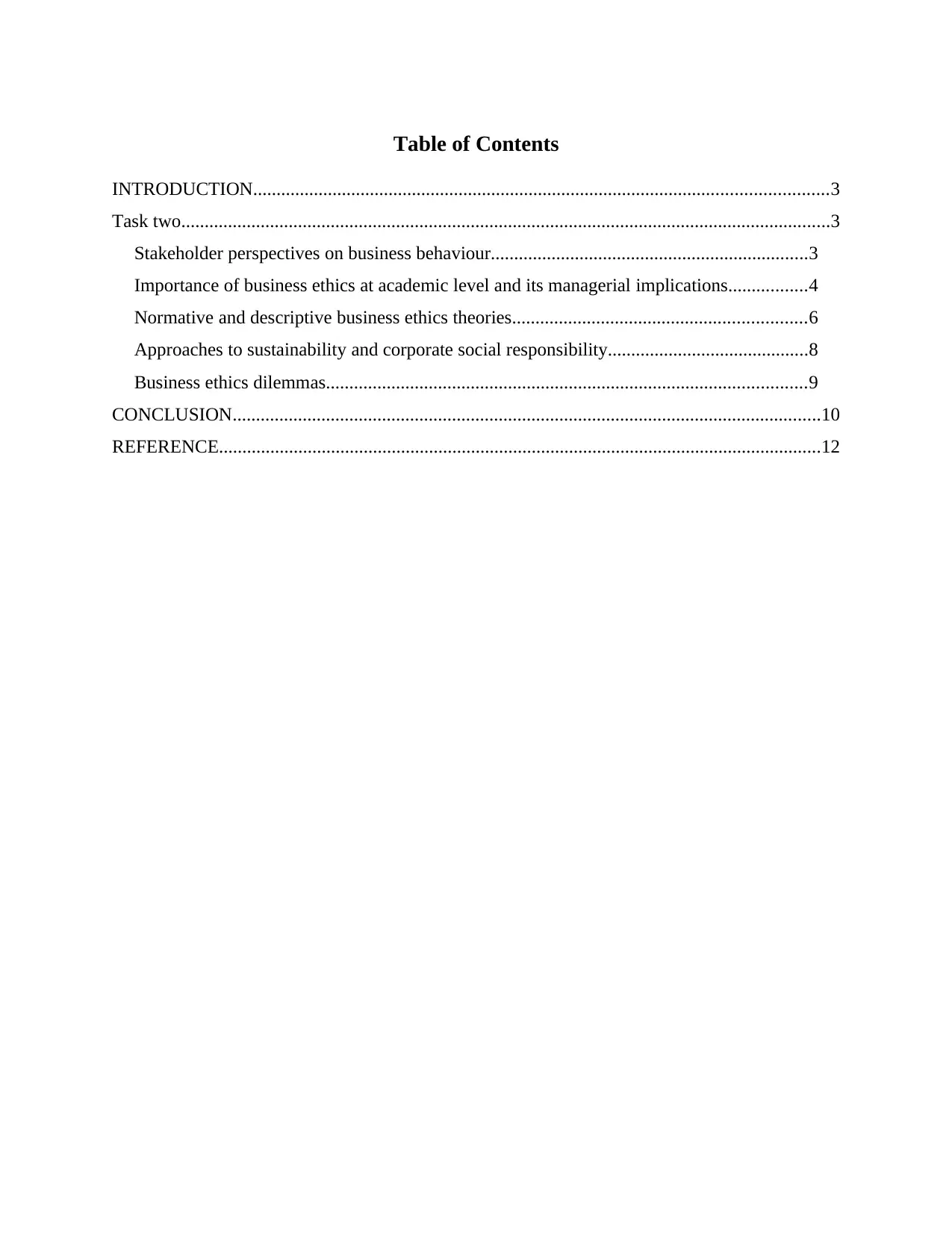
Table of Contents
INTRODUCTION...........................................................................................................................3
Task two...........................................................................................................................................3
Stakeholder perspectives on business behaviour....................................................................3
Importance of business ethics at academic level and its managerial implications.................4
Normative and descriptive business ethics theories...............................................................6
Approaches to sustainability and corporate social responsibility...........................................8
Business ethics dilemmas.......................................................................................................9
CONCLUSION..............................................................................................................................10
REFERENCE.................................................................................................................................12
INTRODUCTION...........................................................................................................................3
Task two...........................................................................................................................................3
Stakeholder perspectives on business behaviour....................................................................3
Importance of business ethics at academic level and its managerial implications.................4
Normative and descriptive business ethics theories...............................................................6
Approaches to sustainability and corporate social responsibility...........................................8
Business ethics dilemmas.......................................................................................................9
CONCLUSION..............................................................................................................................10
REFERENCE.................................................................................................................................12
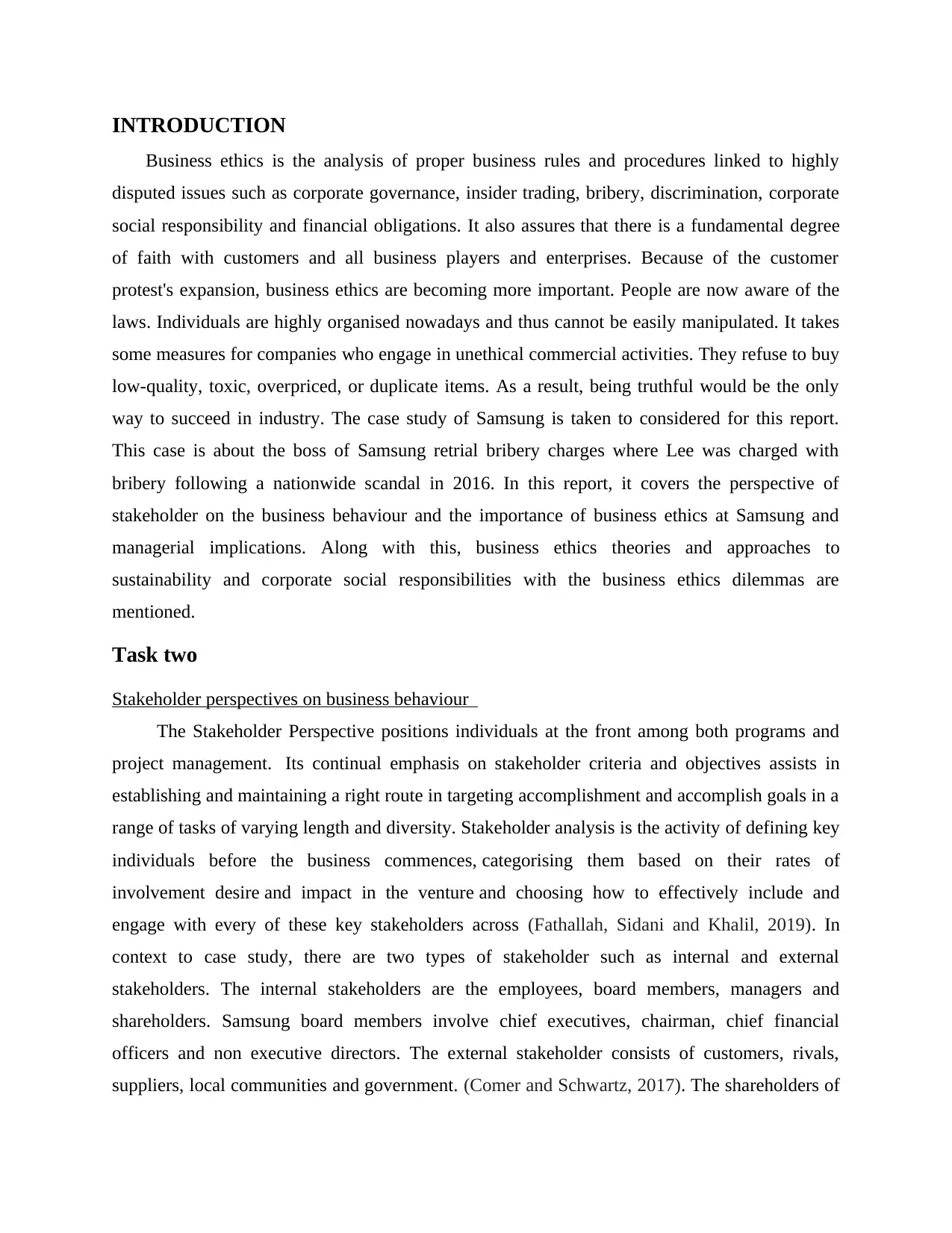
INTRODUCTION
Business ethics is the analysis of proper business rules and procedures linked to highly
disputed issues such as corporate governance, insider trading, bribery, discrimination, corporate
social responsibility and financial obligations. It also assures that there is a fundamental degree
of faith with customers and all business players and enterprises. Because of the customer
protest's expansion, business ethics are becoming more important. People are now aware of the
laws. Individuals are highly organised nowadays and thus cannot be easily manipulated. It takes
some measures for companies who engage in unethical commercial activities. They refuse to buy
low-quality, toxic, overpriced, or duplicate items. As a result, being truthful would be the only
way to succeed in industry. The case study of Samsung is taken to considered for this report.
This case is about the boss of Samsung retrial bribery charges where Lee was charged with
bribery following a nationwide scandal in 2016. In this report, it covers the perspective of
stakeholder on the business behaviour and the importance of business ethics at Samsung and
managerial implications. Along with this, business ethics theories and approaches to
sustainability and corporate social responsibilities with the business ethics dilemmas are
mentioned.
Task two
Stakeholder perspectives on business behaviour
The Stakeholder Perspective positions individuals at the front among both programs and
project management. Its continual emphasis on stakeholder criteria and objectives assists in
establishing and maintaining a right route in targeting accomplishment and accomplish goals in a
range of tasks of varying length and diversity. Stakeholder analysis is the activity of defining key
individuals before the business commences, categorising them based on their rates of
involvement desire and impact in the venture and choosing how to effectively include and
engage with every of these key stakeholders across (Fathallah, Sidani and Khalil, 2019). In
context to case study, there are two types of stakeholder such as internal and external
stakeholders. The internal stakeholders are the employees, board members, managers and
shareholders. Samsung board members involve chief executives, chairman, chief financial
officers and non executive directors. The external stakeholder consists of customers, rivals,
suppliers, local communities and government. (Comer and Schwartz, 2017). The shareholders of
Business ethics is the analysis of proper business rules and procedures linked to highly
disputed issues such as corporate governance, insider trading, bribery, discrimination, corporate
social responsibility and financial obligations. It also assures that there is a fundamental degree
of faith with customers and all business players and enterprises. Because of the customer
protest's expansion, business ethics are becoming more important. People are now aware of the
laws. Individuals are highly organised nowadays and thus cannot be easily manipulated. It takes
some measures for companies who engage in unethical commercial activities. They refuse to buy
low-quality, toxic, overpriced, or duplicate items. As a result, being truthful would be the only
way to succeed in industry. The case study of Samsung is taken to considered for this report.
This case is about the boss of Samsung retrial bribery charges where Lee was charged with
bribery following a nationwide scandal in 2016. In this report, it covers the perspective of
stakeholder on the business behaviour and the importance of business ethics at Samsung and
managerial implications. Along with this, business ethics theories and approaches to
sustainability and corporate social responsibilities with the business ethics dilemmas are
mentioned.
Task two
Stakeholder perspectives on business behaviour
The Stakeholder Perspective positions individuals at the front among both programs and
project management. Its continual emphasis on stakeholder criteria and objectives assists in
establishing and maintaining a right route in targeting accomplishment and accomplish goals in a
range of tasks of varying length and diversity. Stakeholder analysis is the activity of defining key
individuals before the business commences, categorising them based on their rates of
involvement desire and impact in the venture and choosing how to effectively include and
engage with every of these key stakeholders across (Fathallah, Sidani and Khalil, 2019). In
context to case study, there are two types of stakeholder such as internal and external
stakeholders. The internal stakeholders are the employees, board members, managers and
shareholders. Samsung board members involve chief executives, chairman, chief financial
officers and non executive directors. The external stakeholder consists of customers, rivals,
suppliers, local communities and government. (Comer and Schwartz, 2017). The shareholders of
⊘ This is a preview!⊘
Do you want full access?
Subscribe today to unlock all pages.

Trusted by 1+ million students worldwide
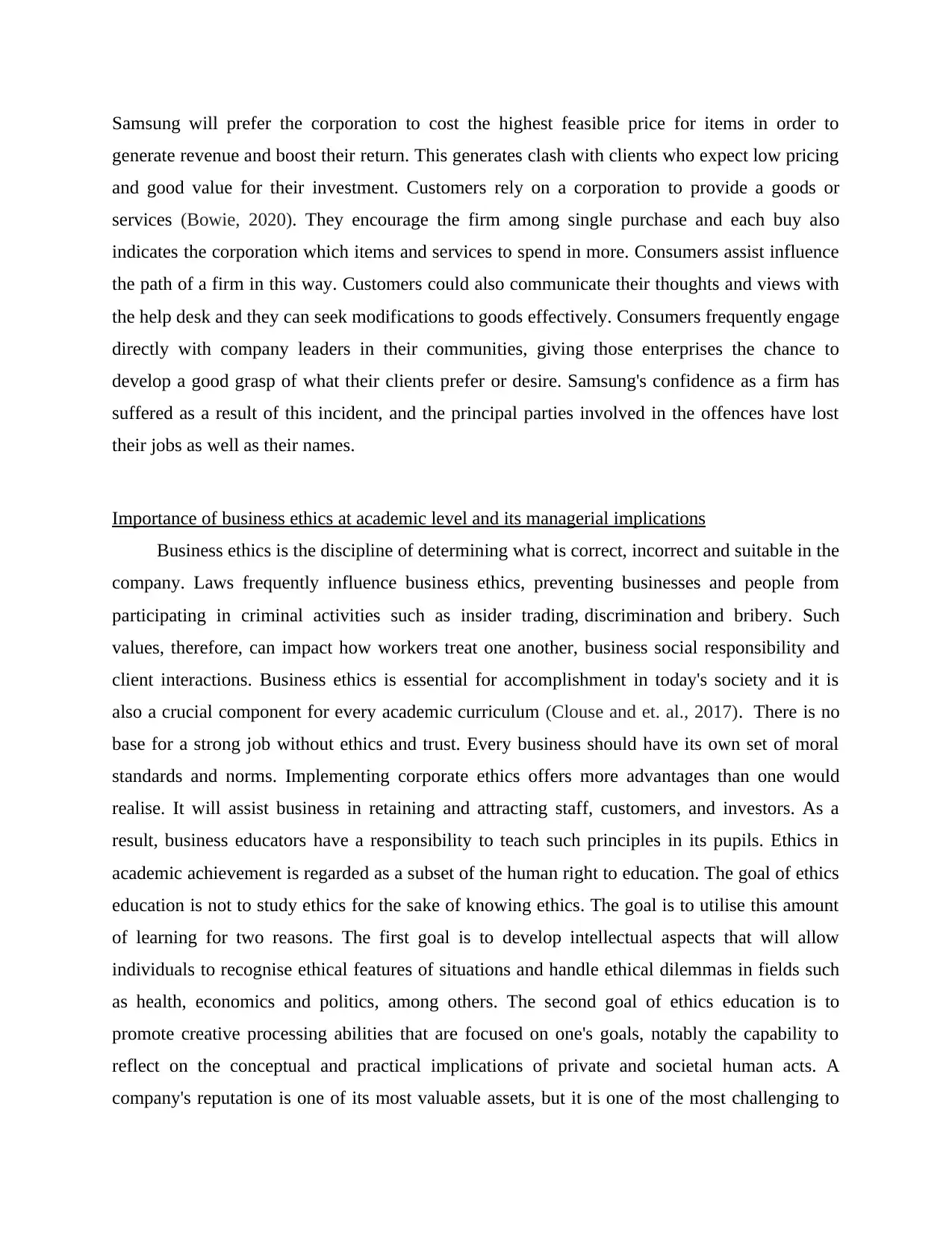
Samsung will prefer the corporation to cost the highest feasible price for items in order to
generate revenue and boost their return. This generates clash with clients who expect low pricing
and good value for their investment. Customers rely on a corporation to provide a goods or
services (Bowie, 2020). They encourage the firm among single purchase and each buy also
indicates the corporation which items and services to spend in more. Consumers assist influence
the path of a firm in this way. Customers could also communicate their thoughts and views with
the help desk and they can seek modifications to goods effectively. Consumers frequently engage
directly with company leaders in their communities, giving those enterprises the chance to
develop a good grasp of what their clients prefer or desire. Samsung's confidence as a firm has
suffered as a result of this incident, and the principal parties involved in the offences have lost
their jobs as well as their names.
Importance of business ethics at academic level and its managerial implications
Business ethics is the discipline of determining what is correct, incorrect and suitable in the
company. Laws frequently influence business ethics, preventing businesses and people from
participating in criminal activities such as insider trading, discrimination and bribery. Such
values, therefore, can impact how workers treat one another, business social responsibility and
client interactions. Business ethics is essential for accomplishment in today's society and it is
also a crucial component for every academic curriculum (Clouse and et. al., 2017). There is no
base for a strong job without ethics and trust. Every business should have its own set of moral
standards and norms. Implementing corporate ethics offers more advantages than one would
realise. It will assist business in retaining and attracting staff, customers, and investors. As a
result, business educators have a responsibility to teach such principles in its pupils. Ethics in
academic achievement is regarded as a subset of the human right to education. The goal of ethics
education is not to study ethics for the sake of knowing ethics. The goal is to utilise this amount
of learning for two reasons. The first goal is to develop intellectual aspects that will allow
individuals to recognise ethical features of situations and handle ethical dilemmas in fields such
as health, economics and politics, among others. The second goal of ethics education is to
promote creative processing abilities that are focused on one's goals, notably the capability to
reflect on the conceptual and practical implications of private and societal human acts. A
company's reputation is one of its most valuable assets, but it is one of the most challenging to
generate revenue and boost their return. This generates clash with clients who expect low pricing
and good value for their investment. Customers rely on a corporation to provide a goods or
services (Bowie, 2020). They encourage the firm among single purchase and each buy also
indicates the corporation which items and services to spend in more. Consumers assist influence
the path of a firm in this way. Customers could also communicate their thoughts and views with
the help desk and they can seek modifications to goods effectively. Consumers frequently engage
directly with company leaders in their communities, giving those enterprises the chance to
develop a good grasp of what their clients prefer or desire. Samsung's confidence as a firm has
suffered as a result of this incident, and the principal parties involved in the offences have lost
their jobs as well as their names.
Importance of business ethics at academic level and its managerial implications
Business ethics is the discipline of determining what is correct, incorrect and suitable in the
company. Laws frequently influence business ethics, preventing businesses and people from
participating in criminal activities such as insider trading, discrimination and bribery. Such
values, therefore, can impact how workers treat one another, business social responsibility and
client interactions. Business ethics is essential for accomplishment in today's society and it is
also a crucial component for every academic curriculum (Clouse and et. al., 2017). There is no
base for a strong job without ethics and trust. Every business should have its own set of moral
standards and norms. Implementing corporate ethics offers more advantages than one would
realise. It will assist business in retaining and attracting staff, customers, and investors. As a
result, business educators have a responsibility to teach such principles in its pupils. Ethics in
academic achievement is regarded as a subset of the human right to education. The goal of ethics
education is not to study ethics for the sake of knowing ethics. The goal is to utilise this amount
of learning for two reasons. The first goal is to develop intellectual aspects that will allow
individuals to recognise ethical features of situations and handle ethical dilemmas in fields such
as health, economics and politics, among others. The second goal of ethics education is to
promote creative processing abilities that are focused on one's goals, notably the capability to
reflect on the conceptual and practical implications of private and societal human acts. A
company's reputation is one of its most valuable assets, but it is one of the most challenging to
Paraphrase This Document
Need a fresh take? Get an instant paraphrase of this document with our AI Paraphraser
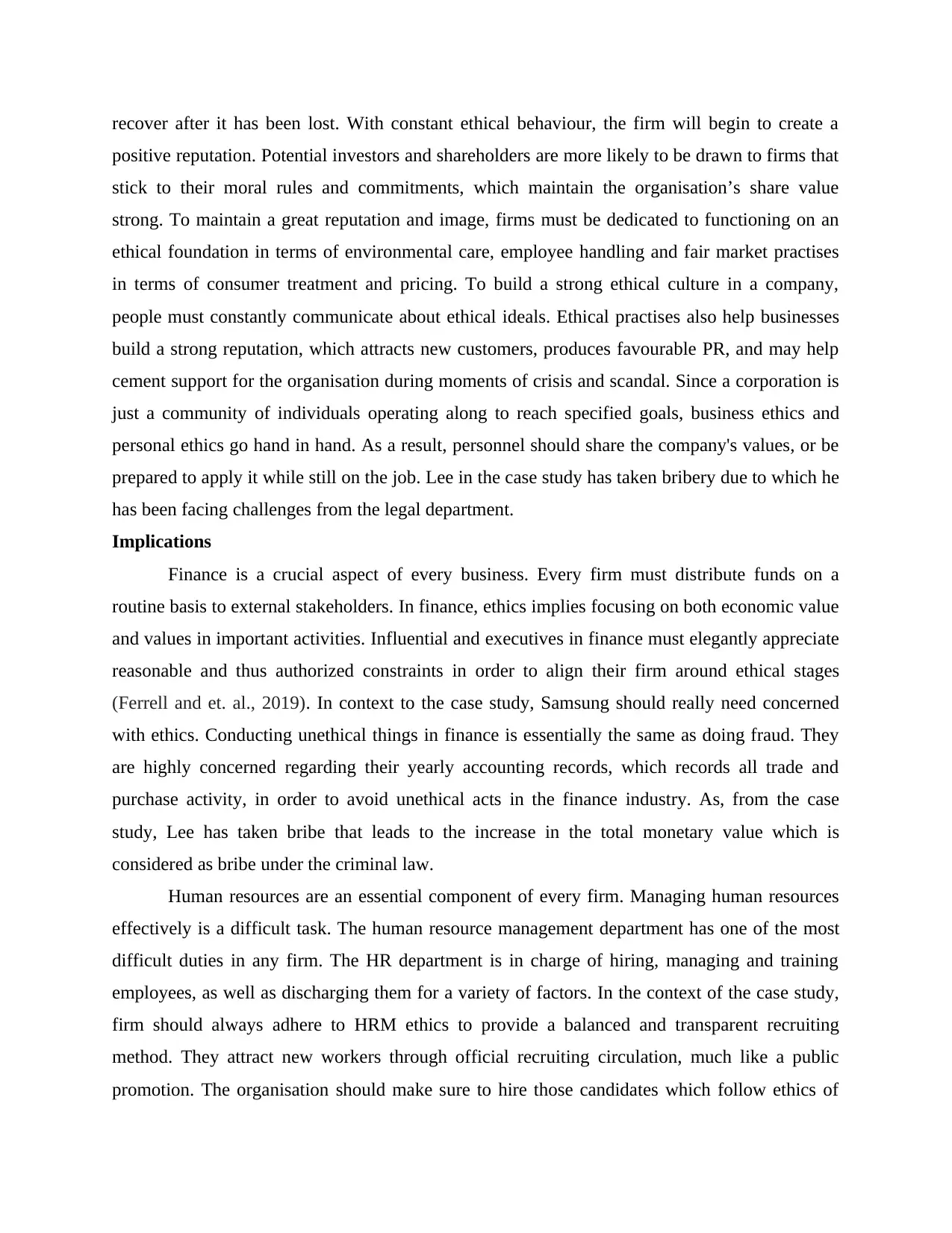
recover after it has been lost. With constant ethical behaviour, the firm will begin to create a
positive reputation. Potential investors and shareholders are more likely to be drawn to firms that
stick to their moral rules and commitments, which maintain the organisation’s share value
strong. To maintain a great reputation and image, firms must be dedicated to functioning on an
ethical foundation in terms of environmental care, employee handling and fair market practises
in terms of consumer treatment and pricing. To build a strong ethical culture in a company,
people must constantly communicate about ethical ideals. Ethical practises also help businesses
build a strong reputation, which attracts new customers, produces favourable PR, and may help
cement support for the organisation during moments of crisis and scandal. Since a corporation is
just a community of individuals operating along to reach specified goals, business ethics and
personal ethics go hand in hand. As a result, personnel should share the company's values, or be
prepared to apply it while still on the job. Lee in the case study has taken bribery due to which he
has been facing challenges from the legal department.
Implications
Finance is a crucial aspect of every business. Every firm must distribute funds on a
routine basis to external stakeholders. In finance, ethics implies focusing on both economic value
and values in important activities. Influential and executives in finance must elegantly appreciate
reasonable and thus authorized constraints in order to align their firm around ethical stages
(Ferrell and et. al., 2019). In context to the case study, Samsung should really need concerned
with ethics. Conducting unethical things in finance is essentially the same as doing fraud. They
are highly concerned regarding their yearly accounting records, which records all trade and
purchase activity, in order to avoid unethical acts in the finance industry. As, from the case
study, Lee has taken bribe that leads to the increase in the total monetary value which is
considered as bribe under the criminal law.
Human resources are an essential component of every firm. Managing human resources
effectively is a difficult task. The human resource management department has one of the most
difficult duties in any firm. The HR department is in charge of hiring, managing and training
employees, as well as discharging them for a variety of factors. In the context of the case study,
firm should always adhere to HRM ethics to provide a balanced and transparent recruiting
method. They attract new workers through official recruiting circulation, much like a public
promotion. The organisation should make sure to hire those candidates which follow ethics of
positive reputation. Potential investors and shareholders are more likely to be drawn to firms that
stick to their moral rules and commitments, which maintain the organisation’s share value
strong. To maintain a great reputation and image, firms must be dedicated to functioning on an
ethical foundation in terms of environmental care, employee handling and fair market practises
in terms of consumer treatment and pricing. To build a strong ethical culture in a company,
people must constantly communicate about ethical ideals. Ethical practises also help businesses
build a strong reputation, which attracts new customers, produces favourable PR, and may help
cement support for the organisation during moments of crisis and scandal. Since a corporation is
just a community of individuals operating along to reach specified goals, business ethics and
personal ethics go hand in hand. As a result, personnel should share the company's values, or be
prepared to apply it while still on the job. Lee in the case study has taken bribery due to which he
has been facing challenges from the legal department.
Implications
Finance is a crucial aspect of every business. Every firm must distribute funds on a
routine basis to external stakeholders. In finance, ethics implies focusing on both economic value
and values in important activities. Influential and executives in finance must elegantly appreciate
reasonable and thus authorized constraints in order to align their firm around ethical stages
(Ferrell and et. al., 2019). In context to the case study, Samsung should really need concerned
with ethics. Conducting unethical things in finance is essentially the same as doing fraud. They
are highly concerned regarding their yearly accounting records, which records all trade and
purchase activity, in order to avoid unethical acts in the finance industry. As, from the case
study, Lee has taken bribe that leads to the increase in the total monetary value which is
considered as bribe under the criminal law.
Human resources are an essential component of every firm. Managing human resources
effectively is a difficult task. The human resource management department has one of the most
difficult duties in any firm. The HR department is in charge of hiring, managing and training
employees, as well as discharging them for a variety of factors. In the context of the case study,
firm should always adhere to HRM ethics to provide a balanced and transparent recruiting
method. They attract new workers through official recruiting circulation, much like a public
promotion. The organisation should make sure to hire those candidates which follow ethics of
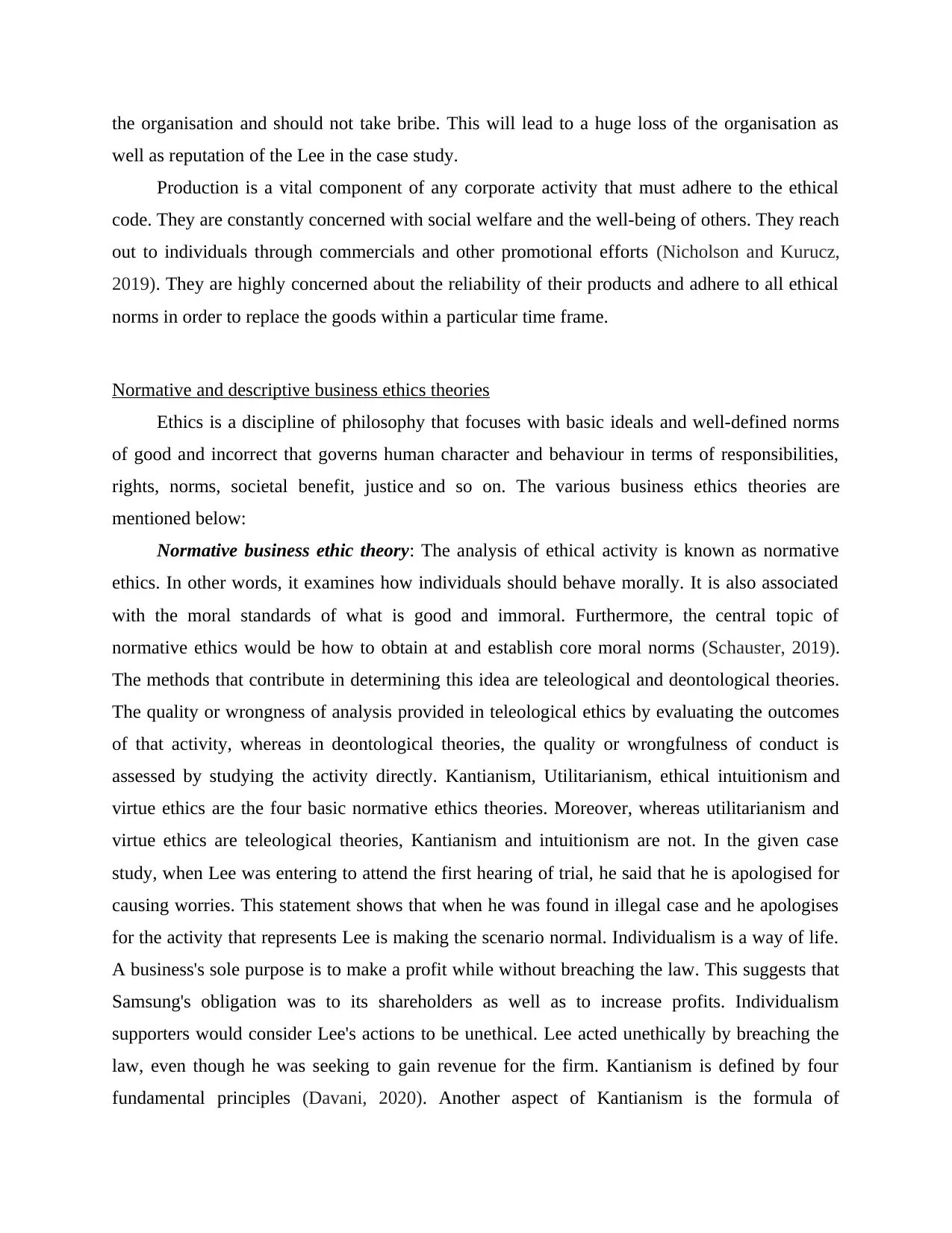
the organisation and should not take bribe. This will lead to a huge loss of the organisation as
well as reputation of the Lee in the case study.
Production is a vital component of any corporate activity that must adhere to the ethical
code. They are constantly concerned with social welfare and the well-being of others. They reach
out to individuals through commercials and other promotional efforts (Nicholson and Kurucz,
2019). They are highly concerned about the reliability of their products and adhere to all ethical
norms in order to replace the goods within a particular time frame.
Normative and descriptive business ethics theories
Ethics is a discipline of philosophy that focuses with basic ideals and well-defined norms
of good and incorrect that governs human character and behaviour in terms of responsibilities,
rights, norms, societal benefit, justice and so on. The various business ethics theories are
mentioned below:
Normative business ethic theory: The analysis of ethical activity is known as normative
ethics. In other words, it examines how individuals should behave morally. It is also associated
with the moral standards of what is good and immoral. Furthermore, the central topic of
normative ethics would be how to obtain at and establish core moral norms (Schauster, 2019).
The methods that contribute in determining this idea are teleological and deontological theories.
The quality or wrongness of analysis provided in teleological ethics by evaluating the outcomes
of that activity, whereas in deontological theories, the quality or wrongfulness of conduct is
assessed by studying the activity directly. Kantianism, Utilitarianism, ethical intuitionism and
virtue ethics are the four basic normative ethics theories. Moreover, whereas utilitarianism and
virtue ethics are teleological theories, Kantianism and intuitionism are not. In the given case
study, when Lee was entering to attend the first hearing of trial, he said that he is apologised for
causing worries. This statement shows that when he was found in illegal case and he apologises
for the activity that represents Lee is making the scenario normal. Individualism is a way of life.
A business's sole purpose is to make a profit while without breaching the law. This suggests that
Samsung's obligation was to its shareholders as well as to increase profits. Individualism
supporters would consider Lee's actions to be unethical. Lee acted unethically by breaching the
law, even though he was seeking to gain revenue for the firm. Kantianism is defined by four
fundamental principles (Davani, 2020). Another aspect of Kantianism is the formula of
well as reputation of the Lee in the case study.
Production is a vital component of any corporate activity that must adhere to the ethical
code. They are constantly concerned with social welfare and the well-being of others. They reach
out to individuals through commercials and other promotional efforts (Nicholson and Kurucz,
2019). They are highly concerned about the reliability of their products and adhere to all ethical
norms in order to replace the goods within a particular time frame.
Normative and descriptive business ethics theories
Ethics is a discipline of philosophy that focuses with basic ideals and well-defined norms
of good and incorrect that governs human character and behaviour in terms of responsibilities,
rights, norms, societal benefit, justice and so on. The various business ethics theories are
mentioned below:
Normative business ethic theory: The analysis of ethical activity is known as normative
ethics. In other words, it examines how individuals should behave morally. It is also associated
with the moral standards of what is good and immoral. Furthermore, the central topic of
normative ethics would be how to obtain at and establish core moral norms (Schauster, 2019).
The methods that contribute in determining this idea are teleological and deontological theories.
The quality or wrongness of analysis provided in teleological ethics by evaluating the outcomes
of that activity, whereas in deontological theories, the quality or wrongfulness of conduct is
assessed by studying the activity directly. Kantianism, Utilitarianism, ethical intuitionism and
virtue ethics are the four basic normative ethics theories. Moreover, whereas utilitarianism and
virtue ethics are teleological theories, Kantianism and intuitionism are not. In the given case
study, when Lee was entering to attend the first hearing of trial, he said that he is apologised for
causing worries. This statement shows that when he was found in illegal case and he apologises
for the activity that represents Lee is making the scenario normal. Individualism is a way of life.
A business's sole purpose is to make a profit while without breaching the law. This suggests that
Samsung's obligation was to its shareholders as well as to increase profits. Individualism
supporters would consider Lee's actions to be unethical. Lee acted unethically by breaching the
law, even though he was seeking to gain revenue for the firm. Kantianism is defined by four
fundamental principles (Davani, 2020). Another aspect of Kantianism is the formula of
⊘ This is a preview!⊘
Do you want full access?
Subscribe today to unlock all pages.

Trusted by 1+ million students worldwide
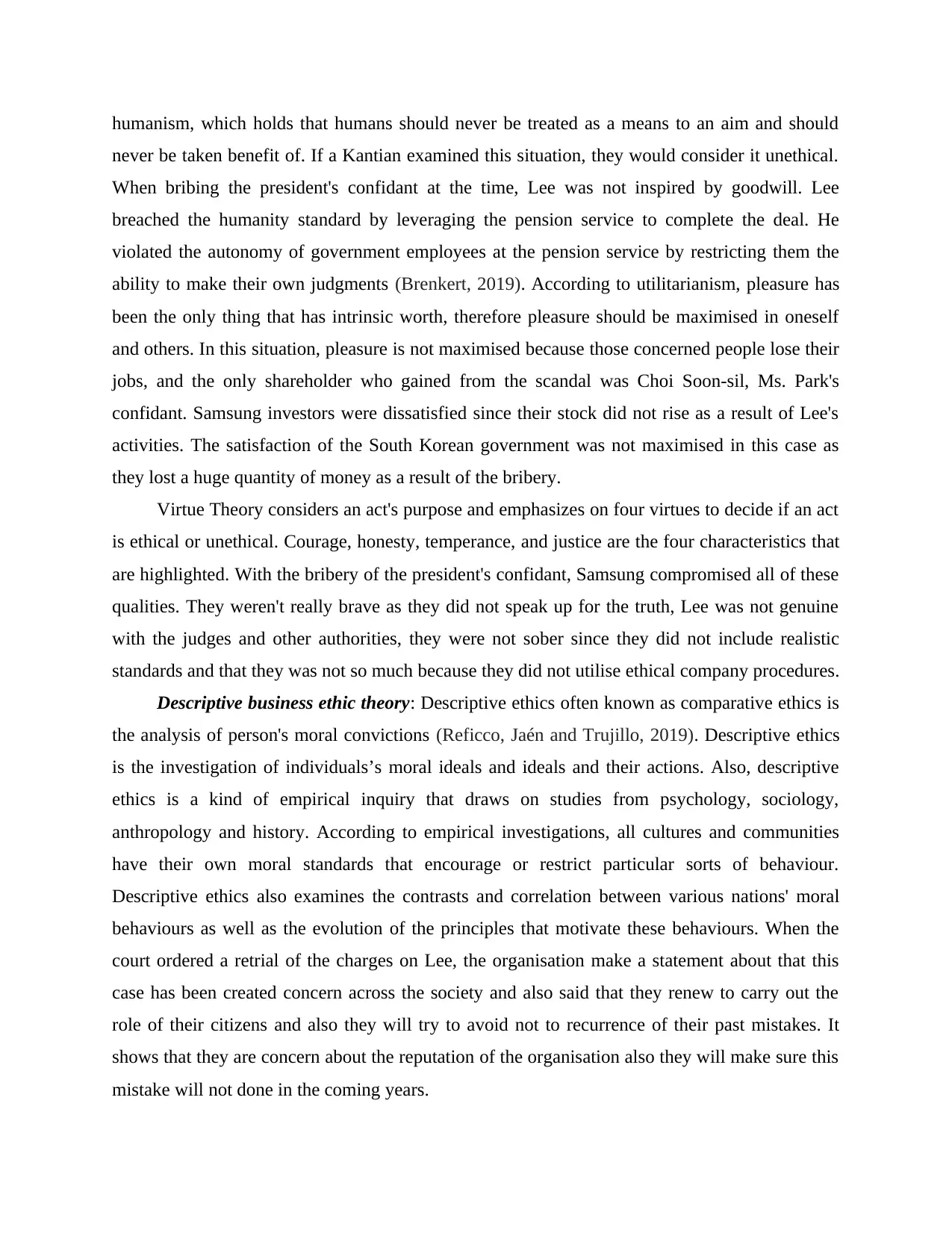
humanism, which holds that humans should never be treated as a means to an aim and should
never be taken benefit of. If a Kantian examined this situation, they would consider it unethical.
When bribing the president's confidant at the time, Lee was not inspired by goodwill. Lee
breached the humanity standard by leveraging the pension service to complete the deal. He
violated the autonomy of government employees at the pension service by restricting them the
ability to make their own judgments (Brenkert, 2019). According to utilitarianism, pleasure has
been the only thing that has intrinsic worth, therefore pleasure should be maximised in oneself
and others. In this situation, pleasure is not maximised because those concerned people lose their
jobs, and the only shareholder who gained from the scandal was Choi Soon-sil, Ms. Park's
confidant. Samsung investors were dissatisfied since their stock did not rise as a result of Lee's
activities. The satisfaction of the South Korean government was not maximised in this case as
they lost a huge quantity of money as a result of the bribery.
Virtue Theory considers an act's purpose and emphasizes on four virtues to decide if an act
is ethical or unethical. Courage, honesty, temperance, and justice are the four characteristics that
are highlighted. With the bribery of the president's confidant, Samsung compromised all of these
qualities. They weren't really brave as they did not speak up for the truth, Lee was not genuine
with the judges and other authorities, they were not sober since they did not include realistic
standards and that they was not so much because they did not utilise ethical company procedures.
Descriptive business ethic theory: Descriptive ethics often known as comparative ethics is
the analysis of person's moral convictions (Reficco, Jaén and Trujillo, 2019). Descriptive ethics
is the investigation of individuals’s moral ideals and ideals and their actions. Also, descriptive
ethics is a kind of empirical inquiry that draws on studies from psychology, sociology,
anthropology and history. According to empirical investigations, all cultures and communities
have their own moral standards that encourage or restrict particular sorts of behaviour.
Descriptive ethics also examines the contrasts and correlation between various nations' moral
behaviours as well as the evolution of the principles that motivate these behaviours. When the
court ordered a retrial of the charges on Lee, the organisation make a statement about that this
case has been created concern across the society and also said that they renew to carry out the
role of their citizens and also they will try to avoid not to recurrence of their past mistakes. It
shows that they are concern about the reputation of the organisation also they will make sure this
mistake will not done in the coming years.
never be taken benefit of. If a Kantian examined this situation, they would consider it unethical.
When bribing the president's confidant at the time, Lee was not inspired by goodwill. Lee
breached the humanity standard by leveraging the pension service to complete the deal. He
violated the autonomy of government employees at the pension service by restricting them the
ability to make their own judgments (Brenkert, 2019). According to utilitarianism, pleasure has
been the only thing that has intrinsic worth, therefore pleasure should be maximised in oneself
and others. In this situation, pleasure is not maximised because those concerned people lose their
jobs, and the only shareholder who gained from the scandal was Choi Soon-sil, Ms. Park's
confidant. Samsung investors were dissatisfied since their stock did not rise as a result of Lee's
activities. The satisfaction of the South Korean government was not maximised in this case as
they lost a huge quantity of money as a result of the bribery.
Virtue Theory considers an act's purpose and emphasizes on four virtues to decide if an act
is ethical or unethical. Courage, honesty, temperance, and justice are the four characteristics that
are highlighted. With the bribery of the president's confidant, Samsung compromised all of these
qualities. They weren't really brave as they did not speak up for the truth, Lee was not genuine
with the judges and other authorities, they were not sober since they did not include realistic
standards and that they was not so much because they did not utilise ethical company procedures.
Descriptive business ethic theory: Descriptive ethics often known as comparative ethics is
the analysis of person's moral convictions (Reficco, Jaén and Trujillo, 2019). Descriptive ethics
is the investigation of individuals’s moral ideals and ideals and their actions. Also, descriptive
ethics is a kind of empirical inquiry that draws on studies from psychology, sociology,
anthropology and history. According to empirical investigations, all cultures and communities
have their own moral standards that encourage or restrict particular sorts of behaviour.
Descriptive ethics also examines the contrasts and correlation between various nations' moral
behaviours as well as the evolution of the principles that motivate these behaviours. When the
court ordered a retrial of the charges on Lee, the organisation make a statement about that this
case has been created concern across the society and also said that they renew to carry out the
role of their citizens and also they will try to avoid not to recurrence of their past mistakes. It
shows that they are concern about the reputation of the organisation also they will make sure this
mistake will not done in the coming years.
Paraphrase This Document
Need a fresh take? Get an instant paraphrase of this document with our AI Paraphraser
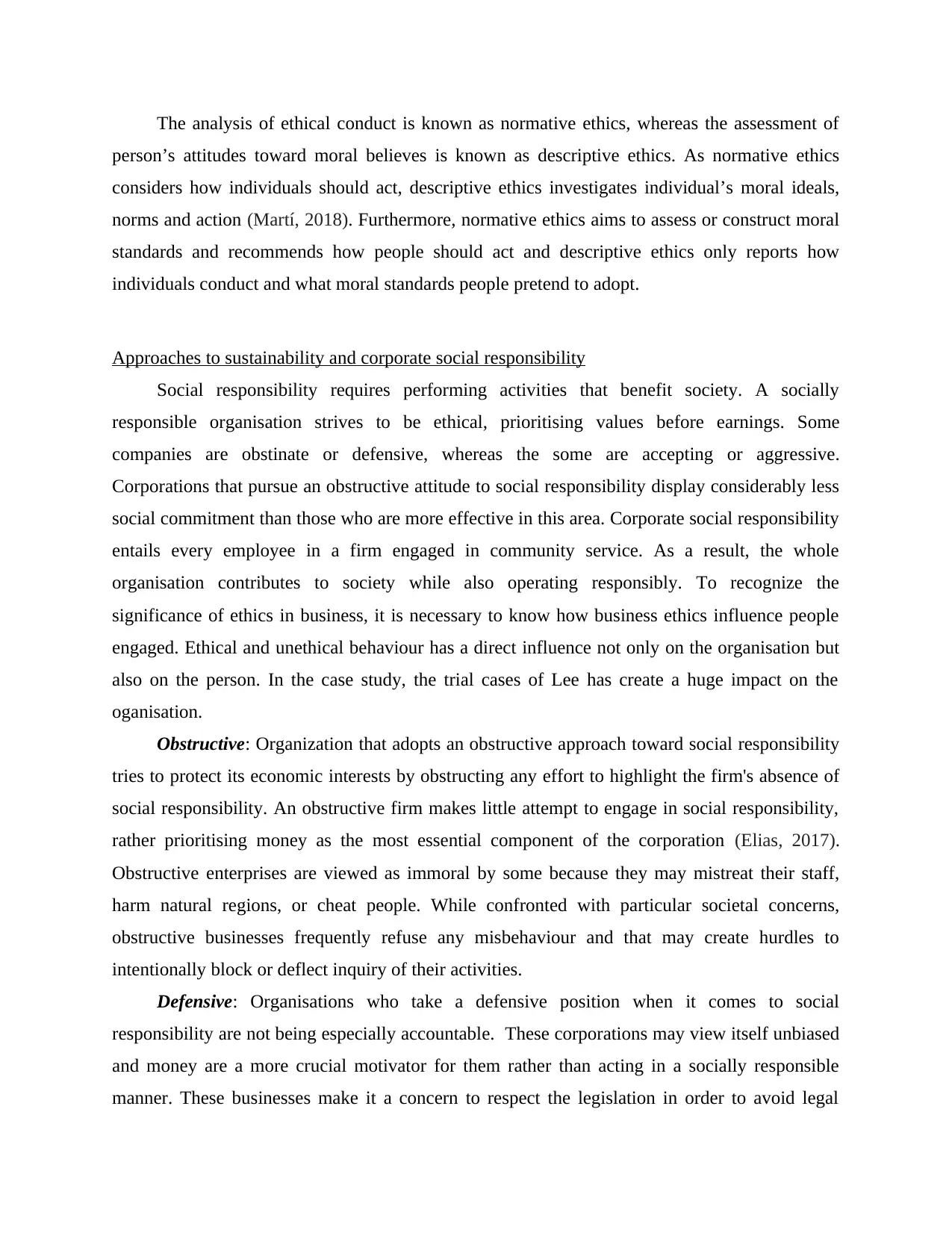
The analysis of ethical conduct is known as normative ethics, whereas the assessment of
person’s attitudes toward moral believes is known as descriptive ethics. As normative ethics
considers how individuals should act, descriptive ethics investigates individual’s moral ideals,
norms and action (Martí, 2018). Furthermore, normative ethics aims to assess or construct moral
standards and recommends how people should act and descriptive ethics only reports how
individuals conduct and what moral standards people pretend to adopt.
Approaches to sustainability and corporate social responsibility
Social responsibility requires performing activities that benefit society. A socially
responsible organisation strives to be ethical, prioritising values before earnings. Some
companies are obstinate or defensive, whereas the some are accepting or aggressive.
Corporations that pursue an obstructive attitude to social responsibility display considerably less
social commitment than those who are more effective in this area. Corporate social responsibility
entails every employee in a firm engaged in community service. As a result, the whole
organisation contributes to society while also operating responsibly. To recognize the
significance of ethics in business, it is necessary to know how business ethics influence people
engaged. Ethical and unethical behaviour has a direct influence not only on the organisation but
also on the person. In the case study, the trial cases of Lee has create a huge impact on the
oganisation.
Obstructive: Organization that adopts an obstructive approach toward social responsibility
tries to protect its economic interests by obstructing any effort to highlight the firm's absence of
social responsibility. An obstructive firm makes little attempt to engage in social responsibility,
rather prioritising money as the most essential component of the corporation (Elias, 2017).
Obstructive enterprises are viewed as immoral by some because they may mistreat their staff,
harm natural regions, or cheat people. While confronted with particular societal concerns,
obstructive businesses frequently refuse any misbehaviour and that may create hurdles to
intentionally block or deflect inquiry of their activities.
Defensive: Organisations who take a defensive position when it comes to social
responsibility are not being especially accountable. These corporations may view itself unbiased
and money are a more crucial motivator for them rather than acting in a socially responsible
manner. These businesses make it a concern to respect the legislation in order to avoid legal
person’s attitudes toward moral believes is known as descriptive ethics. As normative ethics
considers how individuals should act, descriptive ethics investigates individual’s moral ideals,
norms and action (Martí, 2018). Furthermore, normative ethics aims to assess or construct moral
standards and recommends how people should act and descriptive ethics only reports how
individuals conduct and what moral standards people pretend to adopt.
Approaches to sustainability and corporate social responsibility
Social responsibility requires performing activities that benefit society. A socially
responsible organisation strives to be ethical, prioritising values before earnings. Some
companies are obstinate or defensive, whereas the some are accepting or aggressive.
Corporations that pursue an obstructive attitude to social responsibility display considerably less
social commitment than those who are more effective in this area. Corporate social responsibility
entails every employee in a firm engaged in community service. As a result, the whole
organisation contributes to society while also operating responsibly. To recognize the
significance of ethics in business, it is necessary to know how business ethics influence people
engaged. Ethical and unethical behaviour has a direct influence not only on the organisation but
also on the person. In the case study, the trial cases of Lee has create a huge impact on the
oganisation.
Obstructive: Organization that adopts an obstructive approach toward social responsibility
tries to protect its economic interests by obstructing any effort to highlight the firm's absence of
social responsibility. An obstructive firm makes little attempt to engage in social responsibility,
rather prioritising money as the most essential component of the corporation (Elias, 2017).
Obstructive enterprises are viewed as immoral by some because they may mistreat their staff,
harm natural regions, or cheat people. While confronted with particular societal concerns,
obstructive businesses frequently refuse any misbehaviour and that may create hurdles to
intentionally block or deflect inquiry of their activities.
Defensive: Organisations who take a defensive position when it comes to social
responsibility are not being especially accountable. These corporations may view itself unbiased
and money are a more crucial motivator for them rather than acting in a socially responsible
manner. These businesses make it a concern to respect the legislation in order to avoid legal
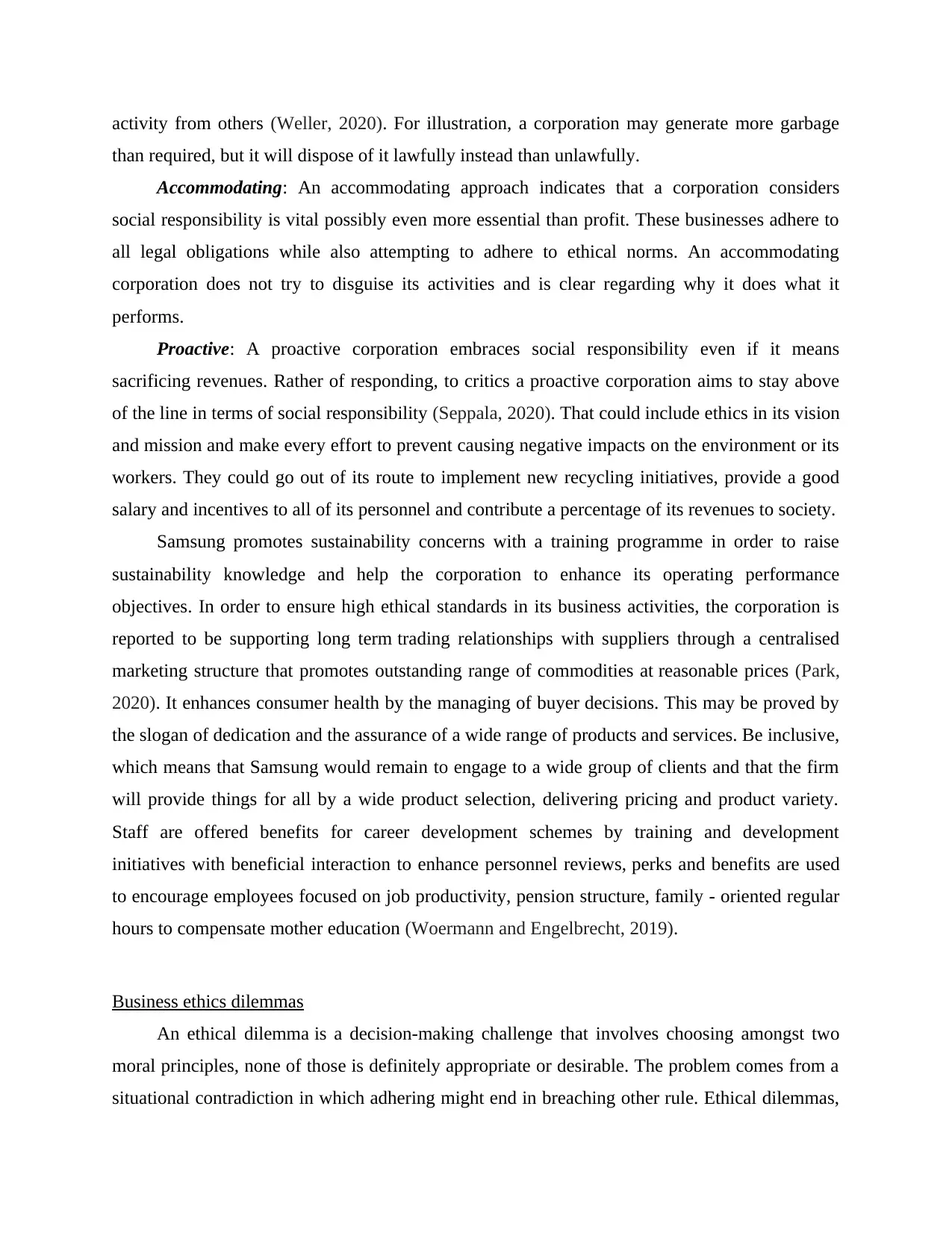
activity from others (Weller, 2020). For illustration, a corporation may generate more garbage
than required, but it will dispose of it lawfully instead than unlawfully.
Accommodating: An accommodating approach indicates that a corporation considers
social responsibility is vital possibly even more essential than profit. These businesses adhere to
all legal obligations while also attempting to adhere to ethical norms. An accommodating
corporation does not try to disguise its activities and is clear regarding why it does what it
performs.
Proactive: A proactive corporation embraces social responsibility even if it means
sacrificing revenues. Rather of responding, to critics a proactive corporation aims to stay above
of the line in terms of social responsibility (Seppala, 2020). That could include ethics in its vision
and mission and make every effort to prevent causing negative impacts on the environment or its
workers. They could go out of its route to implement new recycling initiatives, provide a good
salary and incentives to all of its personnel and contribute a percentage of its revenues to society.
Samsung promotes sustainability concerns with a training programme in order to raise
sustainability knowledge and help the corporation to enhance its operating performance
objectives. In order to ensure high ethical standards in its business activities, the corporation is
reported to be supporting long term trading relationships with suppliers through a centralised
marketing structure that promotes outstanding range of commodities at reasonable prices (Park,
2020). It enhances consumer health by the managing of buyer decisions. This may be proved by
the slogan of dedication and the assurance of a wide range of products and services. Be inclusive,
which means that Samsung would remain to engage to a wide group of clients and that the firm
will provide things for all by a wide product selection, delivering pricing and product variety.
Staff are offered benefits for career development schemes by training and development
initiatives with beneficial interaction to enhance personnel reviews, perks and benefits are used
to encourage employees focused on job productivity, pension structure, family - oriented regular
hours to compensate mother education (Woermann and Engelbrecht, 2019).
Business ethics dilemmas
An ethical dilemma is a decision-making challenge that involves choosing amongst two
moral principles, none of those is definitely appropriate or desirable. The problem comes from a
situational contradiction in which adhering might end in breaching other rule. Ethical dilemmas,
than required, but it will dispose of it lawfully instead than unlawfully.
Accommodating: An accommodating approach indicates that a corporation considers
social responsibility is vital possibly even more essential than profit. These businesses adhere to
all legal obligations while also attempting to adhere to ethical norms. An accommodating
corporation does not try to disguise its activities and is clear regarding why it does what it
performs.
Proactive: A proactive corporation embraces social responsibility even if it means
sacrificing revenues. Rather of responding, to critics a proactive corporation aims to stay above
of the line in terms of social responsibility (Seppala, 2020). That could include ethics in its vision
and mission and make every effort to prevent causing negative impacts on the environment or its
workers. They could go out of its route to implement new recycling initiatives, provide a good
salary and incentives to all of its personnel and contribute a percentage of its revenues to society.
Samsung promotes sustainability concerns with a training programme in order to raise
sustainability knowledge and help the corporation to enhance its operating performance
objectives. In order to ensure high ethical standards in its business activities, the corporation is
reported to be supporting long term trading relationships with suppliers through a centralised
marketing structure that promotes outstanding range of commodities at reasonable prices (Park,
2020). It enhances consumer health by the managing of buyer decisions. This may be proved by
the slogan of dedication and the assurance of a wide range of products and services. Be inclusive,
which means that Samsung would remain to engage to a wide group of clients and that the firm
will provide things for all by a wide product selection, delivering pricing and product variety.
Staff are offered benefits for career development schemes by training and development
initiatives with beneficial interaction to enhance personnel reviews, perks and benefits are used
to encourage employees focused on job productivity, pension structure, family - oriented regular
hours to compensate mother education (Woermann and Engelbrecht, 2019).
Business ethics dilemmas
An ethical dilemma is a decision-making challenge that involves choosing amongst two
moral principles, none of those is definitely appropriate or desirable. The problem comes from a
situational contradiction in which adhering might end in breaching other rule. Ethical dilemmas,
⊘ This is a preview!⊘
Do you want full access?
Subscribe today to unlock all pages.

Trusted by 1+ million students worldwide
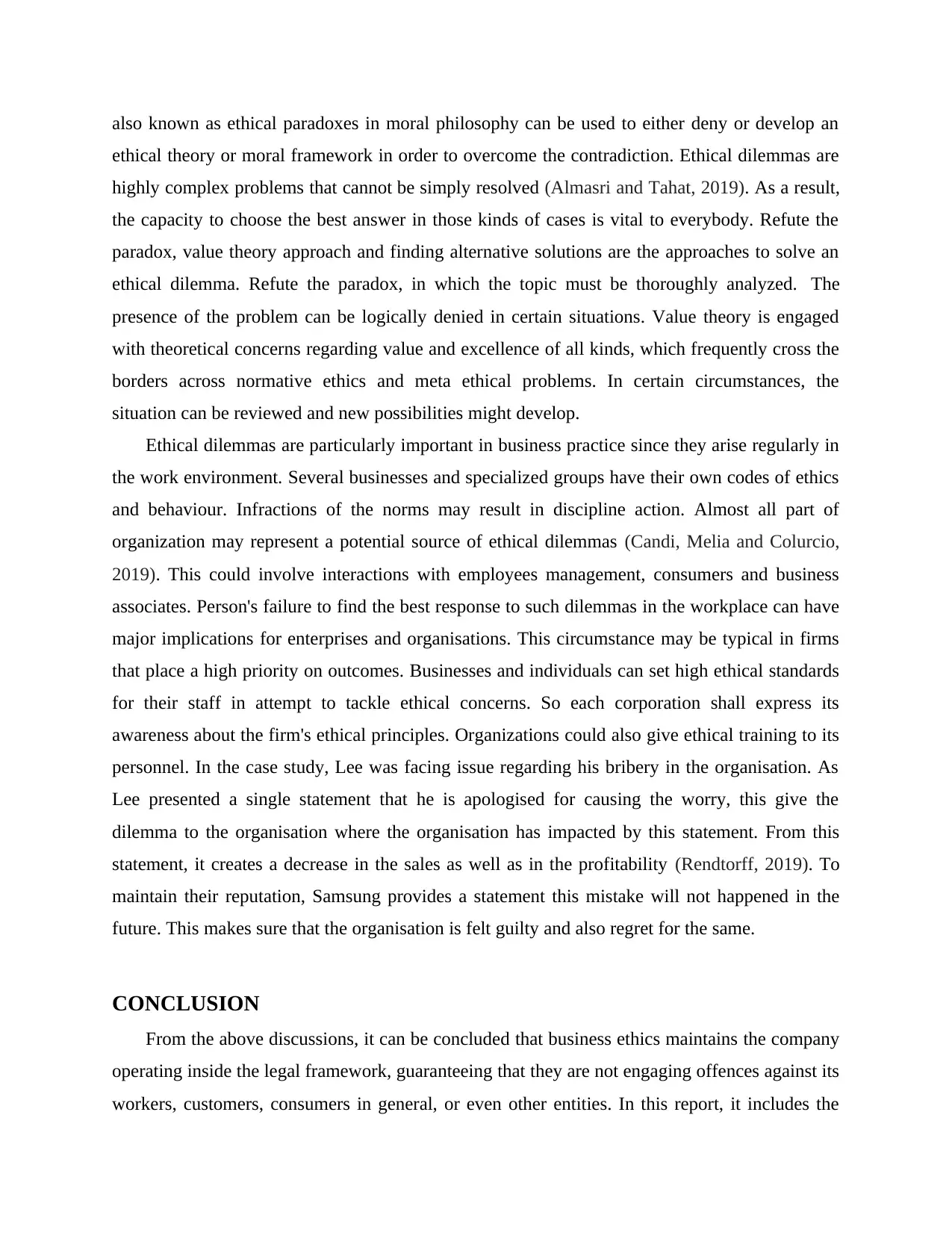
also known as ethical paradoxes in moral philosophy can be used to either deny or develop an
ethical theory or moral framework in order to overcome the contradiction. Ethical dilemmas are
highly complex problems that cannot be simply resolved (Almasri and Tahat, 2019). As a result,
the capacity to choose the best answer in those kinds of cases is vital to everybody. Refute the
paradox, value theory approach and finding alternative solutions are the approaches to solve an
ethical dilemma. Refute the paradox, in which the topic must be thoroughly analyzed. The
presence of the problem can be logically denied in certain situations. Value theory is engaged
with theoretical concerns regarding value and excellence of all kinds, which frequently cross the
borders across normative ethics and meta ethical problems. In certain circumstances, the
situation can be reviewed and new possibilities might develop.
Ethical dilemmas are particularly important in business practice since they arise regularly in
the work environment. Several businesses and specialized groups have their own codes of ethics
and behaviour. Infractions of the norms may result in discipline action. Almost all part of
organization may represent a potential source of ethical dilemmas (Candi, Melia and Colurcio,
2019). This could involve interactions with employees management, consumers and business
associates. Person's failure to find the best response to such dilemmas in the workplace can have
major implications for enterprises and organisations. This circumstance may be typical in firms
that place a high priority on outcomes. Businesses and individuals can set high ethical standards
for their staff in attempt to tackle ethical concerns. So each corporation shall express its
awareness about the firm's ethical principles. Organizations could also give ethical training to its
personnel. In the case study, Lee was facing issue regarding his bribery in the organisation. As
Lee presented a single statement that he is apologised for causing the worry, this give the
dilemma to the organisation where the organisation has impacted by this statement. From this
statement, it creates a decrease in the sales as well as in the profitability (Rendtorff, 2019). To
maintain their reputation, Samsung provides a statement this mistake will not happened in the
future. This makes sure that the organisation is felt guilty and also regret for the same.
CONCLUSION
From the above discussions, it can be concluded that business ethics maintains the company
operating inside the legal framework, guaranteeing that they are not engaging offences against its
workers, customers, consumers in general, or even other entities. In this report, it includes the
ethical theory or moral framework in order to overcome the contradiction. Ethical dilemmas are
highly complex problems that cannot be simply resolved (Almasri and Tahat, 2019). As a result,
the capacity to choose the best answer in those kinds of cases is vital to everybody. Refute the
paradox, value theory approach and finding alternative solutions are the approaches to solve an
ethical dilemma. Refute the paradox, in which the topic must be thoroughly analyzed. The
presence of the problem can be logically denied in certain situations. Value theory is engaged
with theoretical concerns regarding value and excellence of all kinds, which frequently cross the
borders across normative ethics and meta ethical problems. In certain circumstances, the
situation can be reviewed and new possibilities might develop.
Ethical dilemmas are particularly important in business practice since they arise regularly in
the work environment. Several businesses and specialized groups have their own codes of ethics
and behaviour. Infractions of the norms may result in discipline action. Almost all part of
organization may represent a potential source of ethical dilemmas (Candi, Melia and Colurcio,
2019). This could involve interactions with employees management, consumers and business
associates. Person's failure to find the best response to such dilemmas in the workplace can have
major implications for enterprises and organisations. This circumstance may be typical in firms
that place a high priority on outcomes. Businesses and individuals can set high ethical standards
for their staff in attempt to tackle ethical concerns. So each corporation shall express its
awareness about the firm's ethical principles. Organizations could also give ethical training to its
personnel. In the case study, Lee was facing issue regarding his bribery in the organisation. As
Lee presented a single statement that he is apologised for causing the worry, this give the
dilemma to the organisation where the organisation has impacted by this statement. From this
statement, it creates a decrease in the sales as well as in the profitability (Rendtorff, 2019). To
maintain their reputation, Samsung provides a statement this mistake will not happened in the
future. This makes sure that the organisation is felt guilty and also regret for the same.
CONCLUSION
From the above discussions, it can be concluded that business ethics maintains the company
operating inside the legal framework, guaranteeing that they are not engaging offences against its
workers, customers, consumers in general, or even other entities. In this report, it includes the
Paraphrase This Document
Need a fresh take? Get an instant paraphrase of this document with our AI Paraphraser
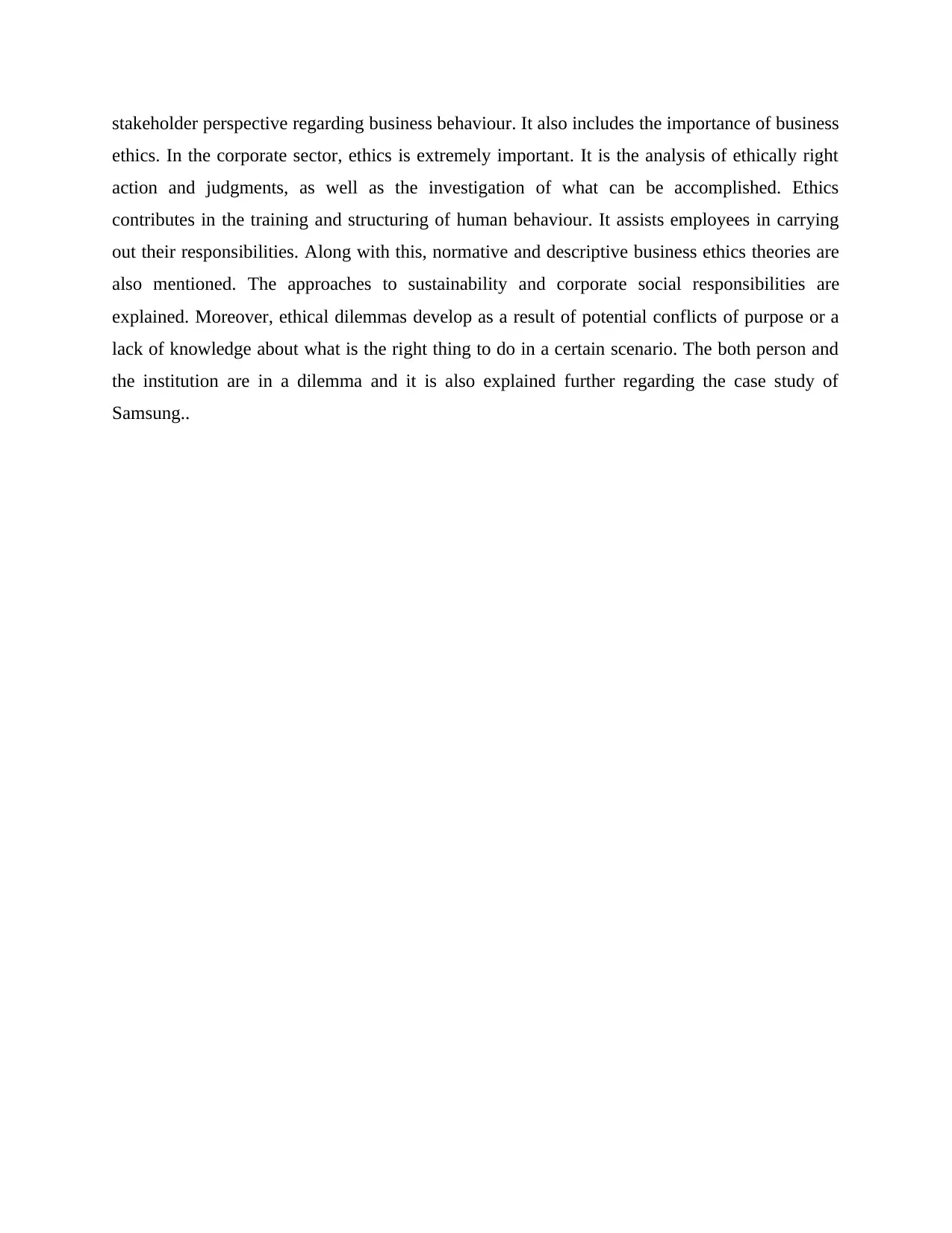
stakeholder perspective regarding business behaviour. It also includes the importance of business
ethics. In the corporate sector, ethics is extremely important. It is the analysis of ethically right
action and judgments, as well as the investigation of what can be accomplished. Ethics
contributes in the training and structuring of human behaviour. It assists employees in carrying
out their responsibilities. Along with this, normative and descriptive business ethics theories are
also mentioned. The approaches to sustainability and corporate social responsibilities are
explained. Moreover, ethical dilemmas develop as a result of potential conflicts of purpose or a
lack of knowledge about what is the right thing to do in a certain scenario. The both person and
the institution are in a dilemma and it is also explained further regarding the case study of
Samsung..
ethics. In the corporate sector, ethics is extremely important. It is the analysis of ethically right
action and judgments, as well as the investigation of what can be accomplished. Ethics
contributes in the training and structuring of human behaviour. It assists employees in carrying
out their responsibilities. Along with this, normative and descriptive business ethics theories are
also mentioned. The approaches to sustainability and corporate social responsibilities are
explained. Moreover, ethical dilemmas develop as a result of potential conflicts of purpose or a
lack of knowledge about what is the right thing to do in a certain scenario. The both person and
the institution are in a dilemma and it is also explained further regarding the case study of
Samsung..
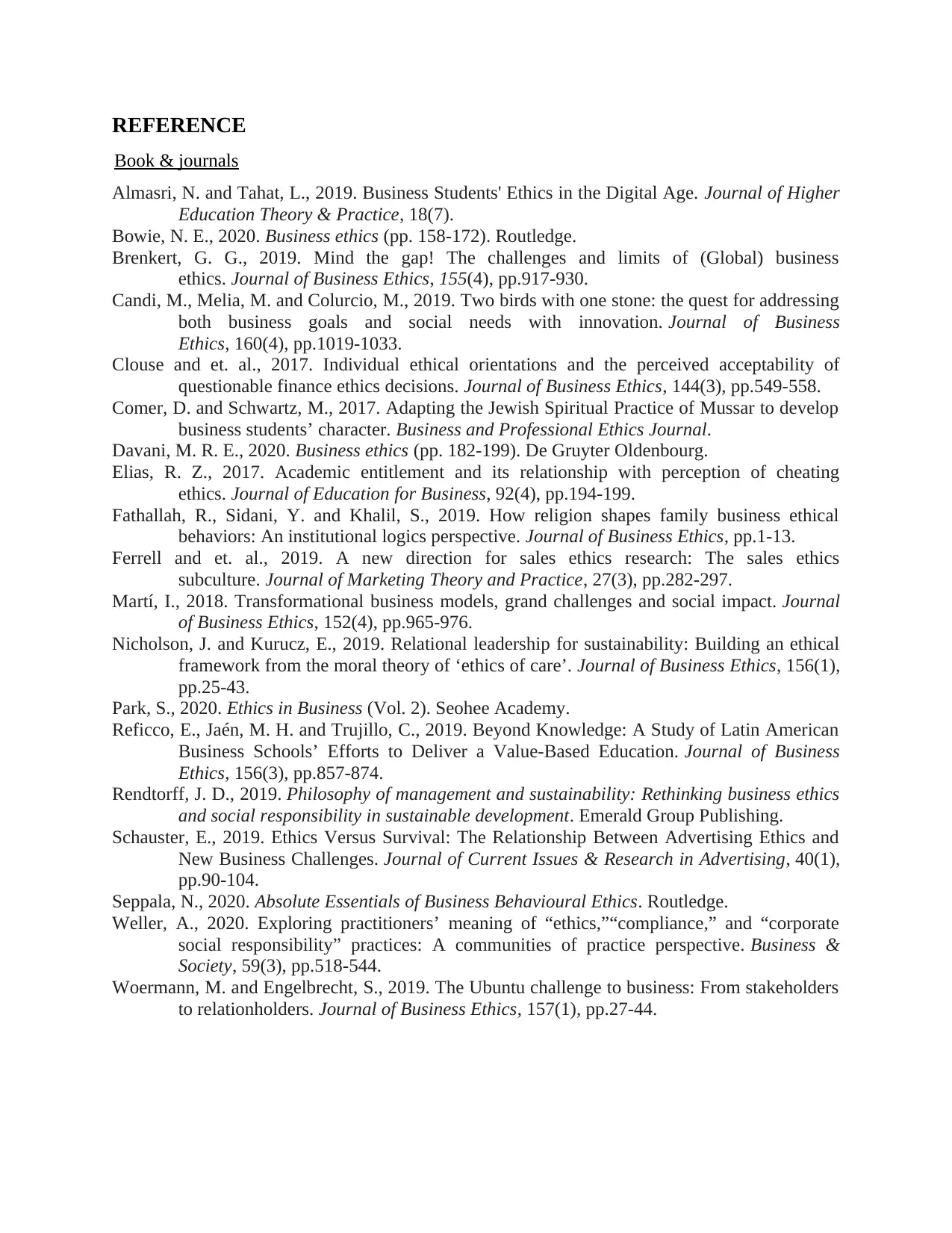
REFERENCE
Book & journals
Almasri, N. and Tahat, L., 2019. Business Students' Ethics in the Digital Age. Journal of Higher
Education Theory & Practice, 18(7).
Bowie, N. E., 2020. Business ethics (pp. 158-172). Routledge.
Brenkert, G. G., 2019. Mind the gap! The challenges and limits of (Global) business
ethics. Journal of Business Ethics, 155(4), pp.917-930.
Candi, M., Melia, M. and Colurcio, M., 2019. Two birds with one stone: the quest for addressing
both business goals and social needs with innovation. Journal of Business
Ethics, 160(4), pp.1019-1033.
Clouse and et. al., 2017. Individual ethical orientations and the perceived acceptability of
questionable finance ethics decisions. Journal of Business Ethics, 144(3), pp.549-558.
Comer, D. and Schwartz, M., 2017. Adapting the Jewish Spiritual Practice of Mussar to develop
business students’ character. Business and Professional Ethics Journal.
Davani, M. R. E., 2020. Business ethics (pp. 182-199). De Gruyter Oldenbourg.
Elias, R. Z., 2017. Academic entitlement and its relationship with perception of cheating
ethics. Journal of Education for Business, 92(4), pp.194-199.
Fathallah, R., Sidani, Y. and Khalil, S., 2019. How religion shapes family business ethical
behaviors: An institutional logics perspective. Journal of Business Ethics, pp.1-13.
Ferrell and et. al., 2019. A new direction for sales ethics research: The sales ethics
subculture. Journal of Marketing Theory and Practice, 27(3), pp.282-297.
Martí, I., 2018. Transformational business models, grand challenges and social impact. Journal
of Business Ethics, 152(4), pp.965-976.
Nicholson, J. and Kurucz, E., 2019. Relational leadership for sustainability: Building an ethical
framework from the moral theory of ‘ethics of care’. Journal of Business Ethics, 156(1),
pp.25-43.
Park, S., 2020. Ethics in Business (Vol. 2). Seohee Academy.
Reficco, E., Jaén, M. H. and Trujillo, C., 2019. Beyond Knowledge: A Study of Latin American
Business Schools’ Efforts to Deliver a Value-Based Education. Journal of Business
Ethics, 156(3), pp.857-874.
Rendtorff, J. D., 2019. Philosophy of management and sustainability: Rethinking business ethics
and social responsibility in sustainable development. Emerald Group Publishing.
Schauster, E., 2019. Ethics Versus Survival: The Relationship Between Advertising Ethics and
New Business Challenges. Journal of Current Issues & Research in Advertising, 40(1),
pp.90-104.
Seppala, N., 2020. Absolute Essentials of Business Behavioural Ethics. Routledge.
Weller, A., 2020. Exploring practitioners’ meaning of “ethics,”“compliance,” and “corporate
social responsibility” practices: A communities of practice perspective. Business &
Society, 59(3), pp.518-544.
Woermann, M. and Engelbrecht, S., 2019. The Ubuntu challenge to business: From stakeholders
to relationholders. Journal of Business Ethics, 157(1), pp.27-44.
Book & journals
Almasri, N. and Tahat, L., 2019. Business Students' Ethics in the Digital Age. Journal of Higher
Education Theory & Practice, 18(7).
Bowie, N. E., 2020. Business ethics (pp. 158-172). Routledge.
Brenkert, G. G., 2019. Mind the gap! The challenges and limits of (Global) business
ethics. Journal of Business Ethics, 155(4), pp.917-930.
Candi, M., Melia, M. and Colurcio, M., 2019. Two birds with one stone: the quest for addressing
both business goals and social needs with innovation. Journal of Business
Ethics, 160(4), pp.1019-1033.
Clouse and et. al., 2017. Individual ethical orientations and the perceived acceptability of
questionable finance ethics decisions. Journal of Business Ethics, 144(3), pp.549-558.
Comer, D. and Schwartz, M., 2017. Adapting the Jewish Spiritual Practice of Mussar to develop
business students’ character. Business and Professional Ethics Journal.
Davani, M. R. E., 2020. Business ethics (pp. 182-199). De Gruyter Oldenbourg.
Elias, R. Z., 2017. Academic entitlement and its relationship with perception of cheating
ethics. Journal of Education for Business, 92(4), pp.194-199.
Fathallah, R., Sidani, Y. and Khalil, S., 2019. How religion shapes family business ethical
behaviors: An institutional logics perspective. Journal of Business Ethics, pp.1-13.
Ferrell and et. al., 2019. A new direction for sales ethics research: The sales ethics
subculture. Journal of Marketing Theory and Practice, 27(3), pp.282-297.
Martí, I., 2018. Transformational business models, grand challenges and social impact. Journal
of Business Ethics, 152(4), pp.965-976.
Nicholson, J. and Kurucz, E., 2019. Relational leadership for sustainability: Building an ethical
framework from the moral theory of ‘ethics of care’. Journal of Business Ethics, 156(1),
pp.25-43.
Park, S., 2020. Ethics in Business (Vol. 2). Seohee Academy.
Reficco, E., Jaén, M. H. and Trujillo, C., 2019. Beyond Knowledge: A Study of Latin American
Business Schools’ Efforts to Deliver a Value-Based Education. Journal of Business
Ethics, 156(3), pp.857-874.
Rendtorff, J. D., 2019. Philosophy of management and sustainability: Rethinking business ethics
and social responsibility in sustainable development. Emerald Group Publishing.
Schauster, E., 2019. Ethics Versus Survival: The Relationship Between Advertising Ethics and
New Business Challenges. Journal of Current Issues & Research in Advertising, 40(1),
pp.90-104.
Seppala, N., 2020. Absolute Essentials of Business Behavioural Ethics. Routledge.
Weller, A., 2020. Exploring practitioners’ meaning of “ethics,”“compliance,” and “corporate
social responsibility” practices: A communities of practice perspective. Business &
Society, 59(3), pp.518-544.
Woermann, M. and Engelbrecht, S., 2019. The Ubuntu challenge to business: From stakeholders
to relationholders. Journal of Business Ethics, 157(1), pp.27-44.
⊘ This is a preview!⊘
Do you want full access?
Subscribe today to unlock all pages.

Trusted by 1+ million students worldwide
1 out of 12
Related Documents
Your All-in-One AI-Powered Toolkit for Academic Success.
+13062052269
info@desklib.com
Available 24*7 on WhatsApp / Email
![[object Object]](/_next/static/media/star-bottom.7253800d.svg)
Unlock your academic potential
Copyright © 2020–2026 A2Z Services. All Rights Reserved. Developed and managed by ZUCOL.





